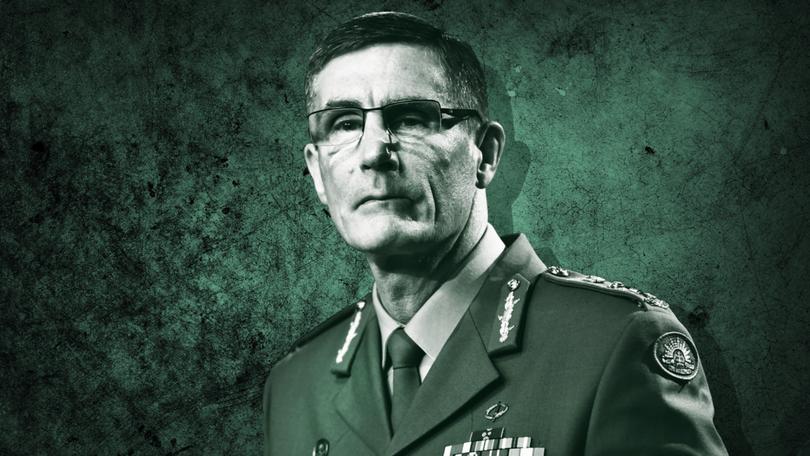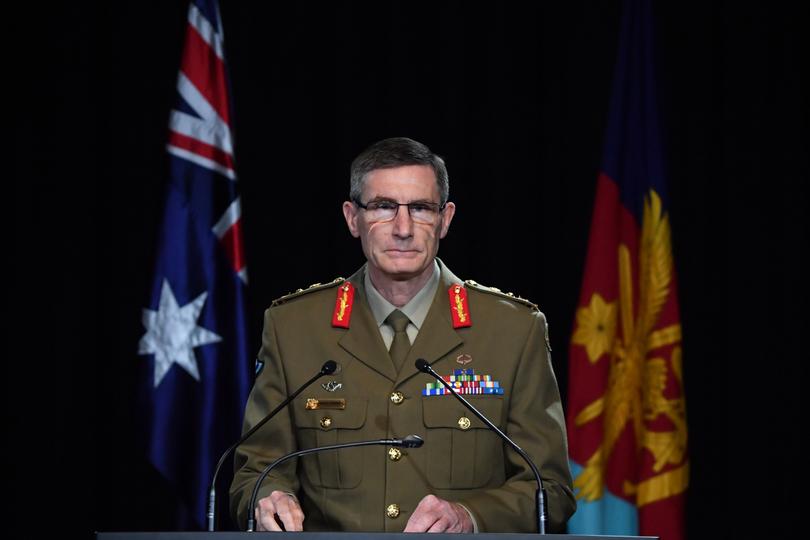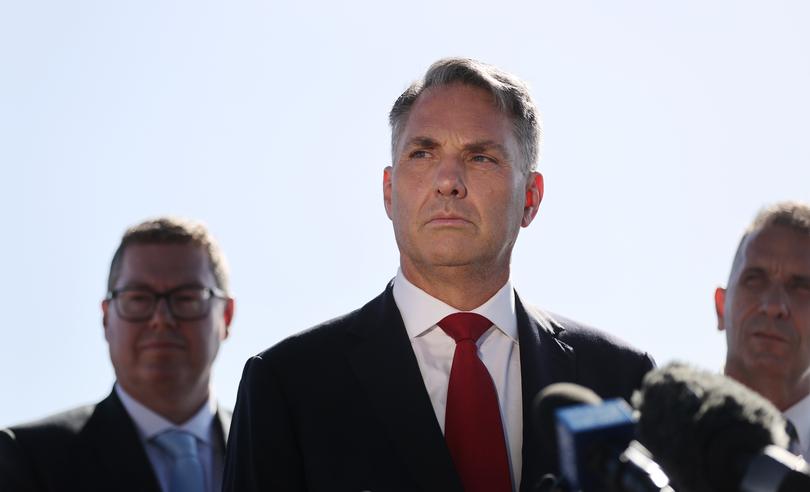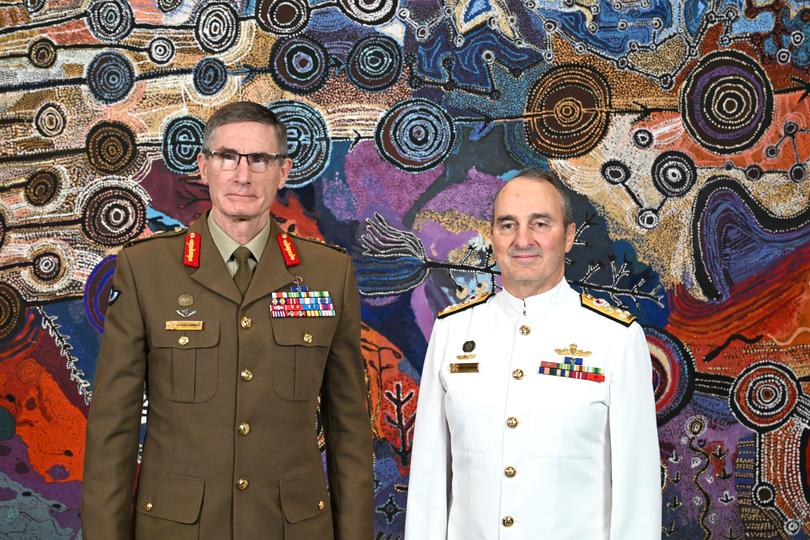Angry vets plea for Labor to revoke Angus Campbell’s Afghanistan medal, saying he did not see enough action
Dozens of retired and serving personnel have written to the Defence Minister amid claims the top honour for the outgoing defence force chief was bestowed on him without merit.

Dozens of retired and serving personnel have written to Defence Minister Richard Marles, demanding he revoke outgoing Defence Force chief Angus Campbell’s distinguished service cross to “restore integrity and trust” in the military.
In a series of letters sent to the minister between November and March — which the concerned personnel say have been ignored — the group called on Mr Marles to overhaul how military honours are bestowed, as they accused senior officers of “abusing” the system.
General Campbell, who steps down as Chief of the Defence Force this month after six years, received the honour in 2012 for his “distinguished command and leadership in action” during his 369-day command in Afghanistan.
Sign up to The Nightly's newsletters.
Get the first look at the digital newspaper, curated daily stories and breaking headlines delivered to your inbox.
By continuing you agree to our Terms and Privacy Policy.But the group, who are still angry over General Campbell’s attempts to strip Afghanistan war decorations from 3000 special forces personnel in 2020, say the government should now forcibly revoke the honour, claiming it was unjustifiably bestowed upon him.
They say General Campbell escalated the matter last year when he wrote to a small number of soldiers who held command positions in the Afghanistan war, informing them their honours for distinguished and conspicuous service could soon be revoked.
Demanding an explanation
In their letters to Mr Marles, dozens of serving and retired special forces, air force and navy personnel queried how General Campbell could have been “in action” when he spent only 112 days actually in Afghanistan, and the rest of his time at the Joint Taskforce-633 headquarters in the United Arab Emirates.
They have demanded Mr Marles force General Campbell to describe “precisely how, when, and where” he was physically present in direct combat during his 34 visits to Afghanistan; “where and when” he was in close proximity, or under fire of an adversary; and whether he truly believed he could have been lawfully awarded the DSC if he was never “in action”.
“If you still believe the award was validly made, I demand that you provide full reasons why you still hold that belief,” the letters said.

One member of the group went a step further late last year, taking their plight to the former Governor General David Hurley — who also served as ADF chief — with demands that he step in. In response, David Hurley’s office said it was a matter for the Defence Minister.
Mr Marles’ office did not respond to direct enquiries, but it is understood the group’s letters have been passed on to Defence Personnel Minister Matt Keogh, who has oversight of the military honours and awards tribunal.
But the group maintain that the government urgently needs to step in. One member, who asked to remain anonymous due to their current employment, wrote to Mr Marles, claiming that General Campbell’s medal “devalues” the award.
“Not only was he never in action, but there was actually nothing spectacular about Campbell’s deployment,” they said.
“It’s disrespectful that he got it and still has it … It completely undermines the value of the award.
“It should be for an officer commanding troops while being shot at. He never was. He never met that criteria.”
Forcing the government to explain the legitimacy of General Campbell’s medals has been the subject of senate estimates questioning for several years now.
Crossbenchers Jacqui Lambie and Malcolm Roberts have both demanded answers over how General Campbell met the definition of being “in action”. Both have also called for the CDF to revoke his medal.
Senator Roberts told The Nightly it was difficult to see how he could have met that criteria when he spent less than one-third of his time in Afghanistan.
“He’s not entitled to it,” Senator Roberts said.
A problem ‘of his own making’
National chairman of the Australian Special Air Service Association Martin Hamilton-Smith said that while General Campbell had served the nation “commendably” during his time as CDF, he had made one glaring mistake that could come to define his time in the role.
He posited that the legitimacy and credibility of General Campbell’s cross was never questioned until November 2020, when the ADF chief accepted the Brereton inquiry’s recommendation to remove the meritorious unit citation from the 3000-person Special Operations Task Group following revelations of alleged war crimes.
While then-defence minister Peter Dutton overruled the move, General Campbell’s attempt sparked widespread ire and criticism.

Then, General Campbell last year wrote to an undisclosed number of soldiers and veterans involved in Afghanistan, asking them to explain why they should not have their medals stripped.
Asked for an update, a defence spokesperson said the government was still “considering the CDF’s recommendation”.
Mr Hamilton-Smith said he didn’t support the stripping of any medals, warning that doing so would create a “very dangerous precedent”.
However, he questioned how it was fair for General Campbell to lead the call to do so while simultaneously seeking to remove himself from questions around accountability, particularly given he was in command of the soldiers around the time of the Brereton allegations.
“Given that he was the commander, commanding these men at an important year of the critical time in question … I think if you’re going to call into question the actions of younger officers who went into battle with their men, and not take some responsibility by putting forward your own medal, I just think the credibility of your argument is diminished,” he said.
Senator Roberts said he, and a large contingent of the defence community, found it hard to swallow General Campbell’s gung-ho attitude towards stripping medals off Afghan forces, while he kept his own.
“He was the eventual commander in charge of those people he (tried to strip) the medals from,” Senator Roberts said.
“The hierarchy of accountability is such that if someone commits a crime, the people above must take responsibility for letting them commit that crime. The buck stops with him.”
General Campbell reportedly tried to hand back his own medals following the release of the Brereton report, but the former Coalition government refused.
Some defence members saw the move as “performative” and “ingenuine” while at the time Senator Lambie questioned why he didn’t “try harder”.
However, executive director of the Australia Defence Association Neil James said he believed General Campbell had tried to do the right thing by offering back his medal.
He claimed General Campbell had been “pilloried” and political interference kept him from doing his job.
“There is unfortunately a sad record of political interference in the command of the defence force that has stopped the CDF doing some of the things that need to be done to restore Australia’s international reputation and professionalism of the defence force in certain units, and we think that’s tragic,” he said.
A sign of a broader problem?
Members of the defence community say they have a problem more broadly with how the honours and awards system operates.
In their letters to Mr Marles, the aggrieved service personnel’s group questioned how General Campbell could have been recommended for the award back in 2011 by his eventual ADF chief successor David Johnston, just seven months into General Campbell’s 12-month tenure as commander of Joint Task Force 633.
“His one-page nomination is rather bland and makes no mention of him being involved in any ‘gun fights’,” the group wrote in its letters.

One defence member told The Nightly the sheer number of “shit gongs” being handed out in the upper echelons was “the worst running joke” in the force.
The group put to Mr Marles that the honours and awards system was being regularly abused by high-ranking personnel.
“There is tangible evidence of this abuse going back nearly 30 years, and there are strong views that most senior commanders, predominantly two-star rank, have been unlawfully awarded the DSC, particularly those who were the Commanders of Joint Task Force 633,” the letters said.
Afghanistan veteran and former army lawyer Glenn Kolomeitz said that given every commander of that task force had received the same honour for “distinguished command and leadership ” consecutively, it could appear as though the honours form “part of a salary package”.
“You can’t tell me they all have done the job so well,” Dr Kolomeitz said.
Multiple members of the defence community also named the change in DSC criteria in 2011, which removed the words “in action” in favour of “in warlike operations” as “dodgy”.
The group put to Mr Marles the letters patent had been changed because “the ADF was aware, and had been for many years, that the requirement for recipients to be ‘in action’ was problematic”.
Call for change
Beyond calling for Mr Marles to revoke General Campbell’s medal, the aggrieved members of the defence community in their letters demanded the minister direct the Defence Honours and Awards Tribunal to inquire into the legality of all awards given to commanders of JTF-633.
They called on Mr Marles to also amend the Defence Act to shift the approval of prestigious awards, particularly those with post-nominals, to DHAAT, saying the defence force “clearly cannot be trusted”.
“The DHHAT board should be given the powers recommended to it in the first place to review these things,” one veteran said.
Dr Kolomeitz agreed the decisions should be taken out of Defence’s hands but queried whether shifting responsibility to the tribunal would work any better.
“It’s a bit like Caesar judging Caesar. It just can’t be a part of the salary package,” he said.
“We need more transparency around the whole process.”
Mr Hamilton-Smith said the government and the force more broadly should reflect on the honours and awards system.
“We’ve probably learned some lessons from Afghanistan, and we should make sure that the awards and decorations go to the soldiers and young officers who lead their men into battle as a matter of principle,” he said.

